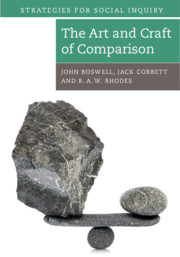4 - Design
Published online by Cambridge University Press: 10 October 2019
Summary
We look at how to design a comparative interpretive project and tackle the perennial case selection question. The problem here is one of justifying unorthodox comparison: a lot has been written on comparative case selection from a naturalist perspective, but this language is often an uncomfortable fit for interpretive projects. We argue that case selection is not something that is designed into a project from inception. For interpretive research, it changes as we go. We therefore suggest different strategies of case selection for different phases of a comparative interpretive project. We identify rules of thumb to guide design choices as the project or programme evolves.
Information
- Type
- Chapter
- Information
- The Art and Craft of Comparison , pp. 54 - 71Publisher: Cambridge University PressPrint publication year: 2019
